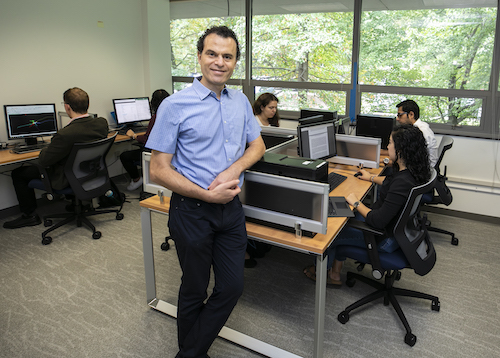In This Story

Giorgio Ascoli, University Professor in the Department of Bioengineering, will receive the Beck Family Medal at the Faculty Awards Reception on May 11 at 4:30 p.m. in the Center for the Arts Lobby. The Beck Family Medal is presented to faculty members whose contributions represent groundbreaking advances in their fields.
“This honor means a great deal to me, and I would like to dedicate it to the memory of Mike Buschmann. Mike was an inspiring role model in his incessant pursuit of scholarly excellence while tirelessly challenging everyone around him to embrace a constant mindset of intellectual growth,” says Ascoli.
Ascoli has dedicated his career to advancements in biochemistry and neuroscience. He investigates the relationship between brain structure, activity, and function from the cellular to the circuit level. In the long term, he seeks to create large-scale, anatomically plausible neural networks to model entire portions of a mammalian brain, such as the hippocampus. Ascoli’s interests also involve human memory and consciousness.
“Dr. Ascoli is best known for his NeuroMorpho.Org database of neuron shapes, which has global impact and is being used by students and scientists around the world,” said Professor Avrama Blackwell, interim department chair in the Department of Bioengineering. Ascoli created NeuroMorpho.Org in 2006 to store the large amounts of data needed to make computational models of neurons. It has grown from 932 reconstructions to more than 240,000. These reconstructions have been used to investigate the pathways of Alzheimer’s disease, epilepsy, and memory capacity.
As part of this award, an account will be established in the George Mason University Foundation with $10,000 in discretionary funds to support Ascoli’s professional work. He plans to use the funds to advance Mason research, especially by leveraging high-risk opportunities with the potential to alter the life course of trainees.
